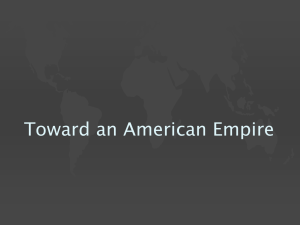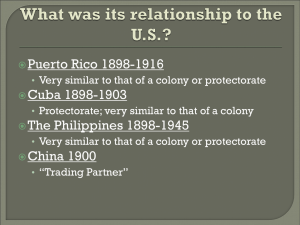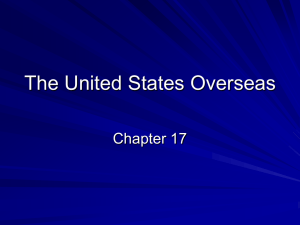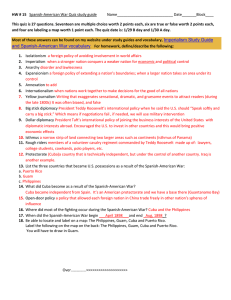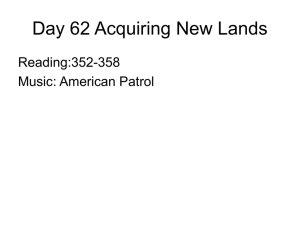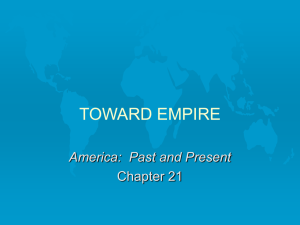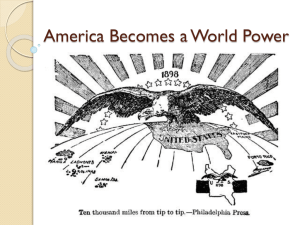Unit 4
advertisement
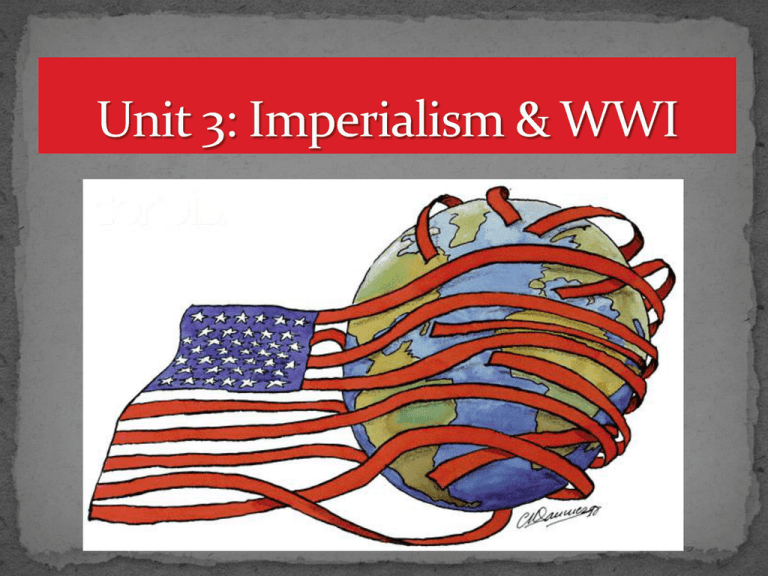
A. Rationales for Imperialism: 1. Ideological Arguments – a. Social Darwinism: survival of the fittest was the law of nations as well as a law of nature. b. “White Man’s Burden” – responsibility to extend the blessings of western rule to less able people c. Missionaries – attempt to evangelize the world 2. Strategic Concerns: a. Mahanism: stressed U.S. Naval, economic, and territorial expansion 1) Alfred Mahan – The Influence of Sea Power 2) Large navy policy = demanded strategic naval bases & cooling stations 3. Economic expansion through foreign trade a. Create larger markets for America A. Late 1800’s: U.S. takes a more aggressive role in world affairs 1. commercial opportunities (new markets for growing industrial production) 2. strategic necessities (desire for greater military strength) 3. national destiny (belief in cultural superiority) * Monroe Doctrine: U.S. to control of the western hemisphere 1. 1887 – U.S. control of Pearl Harbor 2. 1893 – U.S. Marines used to overthrow Hawaiian government and establish a protectorate 3. 1898 – U.S. annexed Hawaii as a result of the Spanish-American War a. strategic stepping stone to the Philippines A. Cuban Revolution, 1895 1. Cubans revolted against oppressive Spanish rule – “reconcentration camps” 2. American economic interest threatened B. Yellow Press – sensationalized news that used exaggerated headlines & stories to stimulate interest a. Increased American interest in Cuba C. U.S. battleship Maine 1. blew up in the harbor of Havana, Cuba 2. U.S. declared war against Spain 3. Teller Amendment – U.S. had no intention of annexing Cuba D. War in the Philippines 1. U.S. Asiatic fleet led by Commodore Dewey a. destroyed the Spanish fleet at Manila Bay 2. U.S. wanted the Philippines for its strategic location in Asia a. economic opportunities in China E. War in Cuba 1. U.S. poor handling of the war a. 5,000 American soldiers died from spoiled food and disease b. Teddy Roosevelt’s “Rough Riders” c. U.S. took Puerto Rico with little opposition F. Treaty of Paris 1. Ended Spanish-American War a. Spain forced to accept Cuban independence, cede Puerto Rico, Guam, and Philippines to U.S. 2. Debate over ratification: a. Expansionist favored acquisition of Philippines for economic reasons b. Anti-Imperialist opposed based on moral and political traditions 3. Treaty was ratified 1899 A. Filipino-American War, 1899 1. Emilio Aguinaldo – issued declaration of independence 2. Treaty of Paris – est. U.S. control 3. Brutal war between U.S. & Filipino nationalist until 1902 B. China & the Open Door Policy 1. foreign “spheres of influence” in China 2. U.S. “Open Door Policy” – wanted European imperial powers to allow commercial and financial activities all nations within their spheres of influence a. Russia & Japan opposed the policy C. Russo-Japanese War, 1904 1. Japanese victory marked its emergence as an imperial power 2. Gentlemen’s Agreement- Japanese immigration to the U.S. A. Cuba as a Protectorate 1. Platt Amendment – restricted Cuba’s autonomy in diplomatic relations with other countries and in internal financial policies B. Panama Canal 1. Treaty of Hay-Bunau-Varilla, 1904: a. Panama Canal Zone became a U.S. Protectorate b. Cut shipping cost, travel time, and increased U.S. military presence C. Roosevelt Corollary, 1904 – attempted to justify U.S. intervention and authority in the region D. Dollar Diplomacy – President Taft 1. “substitution of dollars for bullets” a. encouraged American investments in Latin America b. tied underdeveloped countries to U.S. economically & strategically

